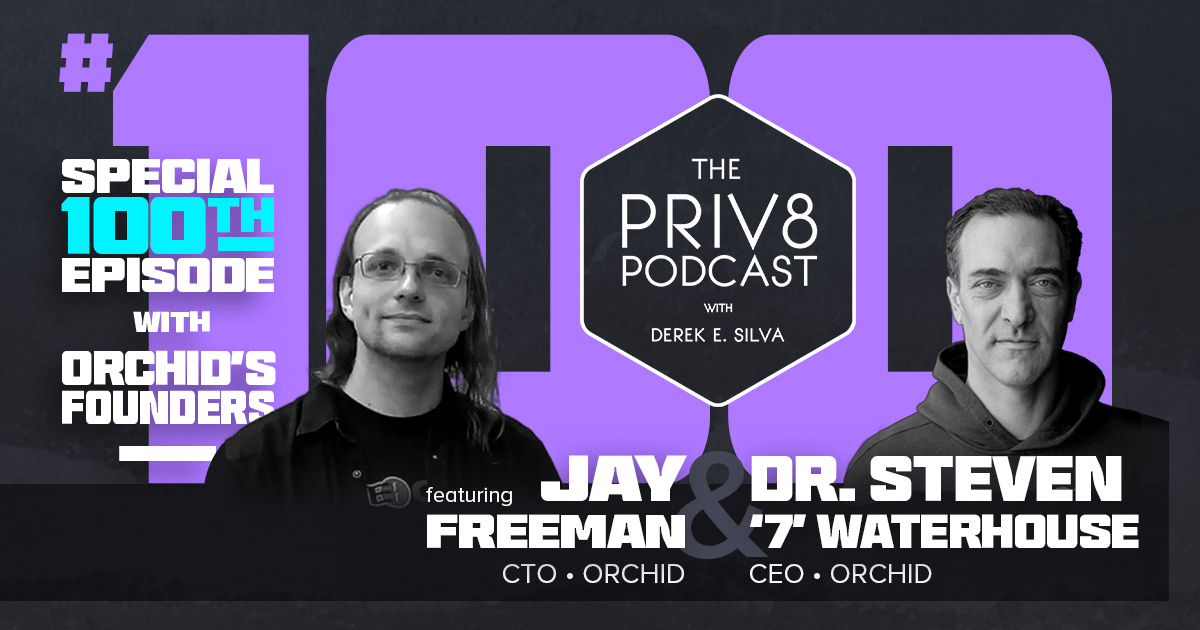
Orchid’s Dr. Steven Waterhouse and Jay Freeman on Orchid's mission and more
Jul 19, 2022A lot has changed since Orchid launched the Priv8 Podcast two years ago. The world is a very different place, particularly in the realm of privacy.
Over the past 24 months, the global pandemic, the expansion of Big Tech, and rising geopolitical tensions have caused many to seek new ways to strengthen their digital privacy. Throughout it all, Priv8 has provided insight and guidance on navigating the changing reality on the Internet. The show has featured conversations with many of the world’s top privacy, technology, and human rights experts – Edward Snowden, Kara Swisher, and Glenn Greenwald, to name just a few.
Today, we’re proud to present the 100th episode of Priv8. To celebrate this milestone, host Derek Silva is interviewing two special guests – Orchid’s CEO Dr. Steven Waterhouse (Seven) and CTO Jay Freeman. Together, Seven and Jay discuss the need for online privacy, crypto’s punk ethos, central bank digital currencies, and more.
The need for digital privacy tools
Derek kicked off the conversation by asking Seven and Jay why the Internet needed an online privacy and content unblocking solution like Orchid.
“One of the inspirations was the way that content is filtered along geopolitical lines, both in terms of what you can see and how other people watch what you do,” Seven said. “For example, if you’ve got journalists in various press regions trying to report, they have to use all sorts of filters and proxies just to communicate properly.
“Today, in many countries, VPNs still aren’t available for public use – or if they are, they’re surveilled and blocked in various ways. We developed Orchid so that people could simply and easily download it, and use it to access the Internet freely. The blockchain-based incentives built into Orchid’s design act as a mechanism for growth. They also allow people to pay for VPN service without using normal banking mechanisms, which are easy to track and censor.”
Jay added that “the idea of intermediaries being able to both control what people can see and to see what people are communicating is incredibly irksome to me.
“It’s just not okay for platforms to hold such a voyeuristic position in people's lives – for example, to be able to see the personal conversations that people are having with their significant others, and to be able to then decide that something in those conversations is inappropriate.
“That’s why we need privacy solutions that provide an end-to-end experience, where people can communicate freely without others deciding what should and should not be said.”
Crypto’s iconoclastic beginnings
Seven described the early days of crypto, which in many ways reflected the ethos of the punk movement that took root in the 1970s.
“The earliest crypto community was made up of a lot of misfits,” he said. “They were people who wanted to push against the boundaries of what was considered normal, or even possible. I think these kinds of unconventional thought processes are crucial for people who are involved in creating startups.”
But things are starting to change – and not necessarily for the better. “Like any sort of revolutionary movement, crypto eventually became popularized. Today, we’re seeing a sort of ‘gentrification’ of crypto. Now we have ‘tech bros.’ And there’s this phenomenon where developers don’t commit to any one project for more than six months, so if something doesn’t work out, it doesn’t affect them. That’s anathema to people who work on things they really care about.”

For Seven, the way to revive crypto’s revolutionary spirit is to inspire people to start working on things they are passionate about. “We need to think more radically – in a more fundamental way – about what our beliefs are and what we’re doing.
“I also believe that focusing on systems that are fundamentally more decentralized than what we’ve built in the past is an important distinction,” Seven continued. “We need to be asking ourselves: What could I do that would actually disrupt something significant?”
Can decentralization protect us from abuses of power?
Creating disruptive decentralized technology is more critical than ever – particularly as the global trend toward centralized power continues. Jay spoke about this in the context of central bank digital currencies, or CBDCs.
“Programmability and permissionless participation are integral parts of what we’ve built in the cryptocurrency ecosystem,” Jay said. “But when we think about how governments might want to use blockchain technology, it seems unlikely that they will build in that direction. Instead, I think we’ll probably see CBDCs that support large-scale settlements between banks – essentially, a replacement for the SWIFT interbank transfer mechanism.
“It’s not that I’m terrified that CBDCs will ruin the world,” Jay continued. “I’m concerned that the creation of CBDCs could eventually lead regulators to consider the work currently being done in the cryptocurrency space to be ‘bad’ or ‘silly,’ and cause them to place heavy restrictions on its use.”
Seven added that he is concerned that creating CBDCs could lead to financial censorship and control.
“The big danger is the idea that governments can program how a CBDC could be used. If I gave you $100 in cash right now, no one could tell you how you can or can’t use it. But restricting the way that people use money would be easy with a CBDC.
“Even if we don’t see CBDCs anytime soon, it’s likely that a slew of regulations will come for crypto in the next couple of years – some of them misguided, some of them sorely needed.”
So has Orchid’s vision shifted since it was first developed five years ago? \
“I don’t feel like the mission has changed, nor should it change at this point,” Jay said. “Thinking back to conversations we had in 2017 about what Orchid would be, we were talking about building an open, unrestricted Internet owned by users – just as we are today.”
Check out the entire conversation with Seven and Jay here. And don't forget to subscribe to Priv8 on your favorite streaming service.
Thank you for 100 episodes of the Priv8 Podcast.
If you enjoyed this blog, subscribe here for privacy news, commentary, and product updates from Orchid.



